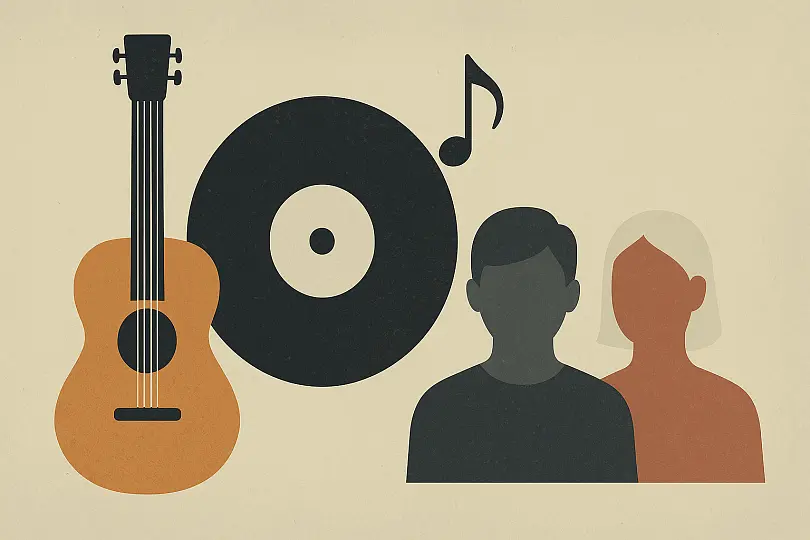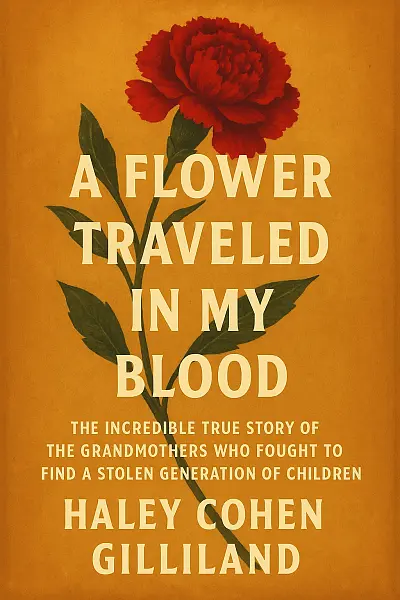
Such Great Heights: The Complete Cultural History of the Indie Rock Explosion
by: Chris DeVille
Chris DeVille is obsessed with the electric world of indie rock, clinging to its secretive, exhilarating aura while navigating the crowded, ever-changing music scene of the early 2000s. Just as streaming threatens to swallow whole the intimate, club-packed subculture he loves, DeVille realizes he must trace how indie’s underdog sound collides with mainstream pop—and question what’s truly lost when "cool" becomes commodified.
As DeVille uncovers the stories behind iconic bands and fan rituals, he’s torn: can indie’s soul survive the industry’s relentless logic?
It’s a witty, nostalgia-soaked ride, capturing the anxiety and thrill of a generation’s “will our secret last?” moment.
""In chasing the margins, indie rock built a center of its own—proof that community, not conformity, shapes the sound of an era.""
Let's Break This Down
The Author's Voice
Atmosphere
Electric yet nostalgic, the book hums with the restless energy of basement shows and late-night radio, but always through a lens tinted with longing for an era slipping away. There’s a real sense of standing in the crowd, sweat-drenched, as the next big thing rips through scratchy amps; you feel the optimism and possibility of indie’s heyday, along with the bittersweet awareness of commercial sameness on the horizon. Everything is vibrant but edged with a kind of mournful fondness, like a mixtape you can’t bring yourself to throw out.
Prose Style
Conversational and sharp, DeVille’s writing is packed with personality, peppered with dry wit, sly observations, and clever turns of phrase. He’s equal parts storyteller and critic, managing to be deeply knowledgeable without ever sounding pretentious. Anecdotes and insightful analysis flow together seamlessly, and the prose veers more toward punchy magazine feature rather than textbook—think enthusiastic essays, not dry cataloguing. Expect clear explanations of cultural shifts, side-notes of music geekery, and a knack for pinpointing exactly what made that guitar riff or zine headline feel revolutionary.
Pacing
The book moves like a perfectly sequenced album: brisk but intentional, giving enough context and color without ever getting bogged down in minutiae. DeVille transitions smoothly between big-picture overviews and intimate close-ups—one moment you’re on the macro level, tracing scene geography across cities, the next you’re zoomed way in on a late-night studio session or DIY flyer. Momentum never really lags, but there’s enough breathing room to soak in the details. Skimmable for casual fans yet welcoming for deep-divers eager to trace every footnote.
Voice & Perspective
Warmly authoritative, DeVille strikes that sweet spot between insider cred and approachable enthusiasm. He speaks as a fan who was there—but never lords it over the reader. There’s a generosity to his reminiscences and a subtle curiosity in his assessments; every chapter feels like a shared conversation, not a lecture. The tone is personal without being self-indulgent, always keeping the subculture’s wider story front and center.
Rhythm & Flow
The narrative bounces and riffs with the music itself—expect energetic tempo shifts, punchy chapter endings, and a structure that mirrors the zigzagging path of indie rock’s evolution. Individual profiles and scene vignettes stand out like memorable solos, stitched together by connective tissue that’s never clunky. Think dynamic playlists, not linear timelines.
Overall Vibe
Such Great Heights delivers an inviting, slightly scrappy, totally alive immersion into the world of indie rock—a guided tour written with heart, humor, and just the right amount of bittersweet nostalgia. If you love the feeling of flipping through old liner notes or chatting about your favorite records at the bar, you’ll feel right at home.
Key Moments
-
Neon-lit basement gigs that launched a revolution
-
Arcade Fire’s Grammy stunner—when the indie underdogs took center stage
-
Candid interviews peel back the mythos of lo-fi authenticity
-
Modest Mouse and the Float On anomaly: How weird became mainstream without losing its soul
-
Electric vignettes of DIY angst, zines, and the back-of-the-van camaraderie
-
Sonic dissection—from jangle-pop riffs to synth-drenched crescendos
-
Sharp reflections on selling out, streaming, and staying true in a changing scene
Plot Summary
Such Great Heights: The Complete Cultural History of the Indie Rock Explosion by Chris DeVille takes readers on a journey through the rise, peak, and transformation of indie rock from the late 1980s to the early 2010s. The book opens with the underground beginnings of bands like R.E.M. and Sonic Youth, charting the evolution of “indie” identity as it collides with mainstream success in the 2000s. Key moments include the unexpected chart-topping of acts such as Arcade Fire and The Shins, internal conflicts and industry shifts as indie wrestles with commercialization, and the climactic backlash against “indie chic.” The narrative closes by examining how streaming, social media, and shifting cultural tastes dissolve the genre’s boundaries, leaving readers to ponder indie’s place in a constantly changing landscape.
Character Analysis
While non-fiction, DeVille skillfully constructs compelling “characters” out of real figures—frontpeople like Win Butler (Arcade Fire), musicians such as Jenny Lewis (Rilo Kiley), and visionaries like Mac McCaughan (Merge Records)—depicting their ambitions, insecurities, and creative struggles. Many undergo significant development: some confront the tension between authenticity and fame, while others reinvent themselves or fade from view as the scene morphs. The shifting motivations—from artistic purity to reluctant acceptance of industry realities—mirror the genre's own maturation.
Major Themes
- Authenticity vs. Commercialization: DeVille constantly probes the question of what makes music "indie"—is it a sound, a business model, or an attitude? The book features real-life debates among musicians who grapple with selling out versus survival, especially as indie acts hit the mainstream.
- Community and Exclusion: The book highlights the inclusivity that built tight-knit indie communities, while also addressing issues of gatekeeping, gender, race, and privilege. For example, DeVille spotlights the struggles of women and artists of color within a scene often perceived as homogenous.
- Evolution of Taste and Technology: With vivid examples from bands exploding on MySpace or going viral, DeVille shows how digital innovation continually reshapes not just music distribution, but fandom itself.
Literary Techniques & Style
DeVille blends oral history with analysis, weaving interview quotes, anecdotes, and cultural critique into a brisk, accessible narrative. His tone is conversational and at times self-aware, often slyly poking fun at the pretensions of indie culture while treating its creative triumphs with genuine respect. He employs recurrent metaphors—indie as a house party that's outgrown itself, or as a movement that "peaked then dissolved into the mainstream"—and uses vivid details (album art, fashion, venues) as symbols of bigger cultural trends. The non-linear structure lets stories overlap, offering a kaleidoscopic sense of a scene in constant motion.
Historical/Cultural Context
Set against the backdrop of late 20th and early 21st-century America, the book draws on shifts like the rise of college radio, DIY labels, mp3 blogs, and the disruption of the music industry by Napster and Spotify. Major cultural events (the Iraq War, Bush era politics, the 2008 recession) frequently frame the music, showing how artists and fans respond to their times—both reflecting and shaping larger social conversations.
Critical Significance & Impact
Such Great Heights has quickly become a touchstone for understanding not just indie rock, but how subcultures evolve and mainstream themselves. Critics have praised its depth and breadth, as well as its balanced take—neither nostalgic nor dismissive—on a beloved, sometimes maligned scene. The book continues to influence discussions about genre, community, and the ever-mutable boundaries between independent and mainstream art.

How indie rock redefined a generation—and reshaped music forever
What Readers Are Saying
Right for You If
Who’s Going to Love This Book (& Who Might Want to Pass):
If you’re the kind of person who still has playlists filled with The Strokes, Arcade Fire, or Vampire Weekend, you’re honestly going to devour this one. Music lovers and indie rock fans—especially those who nostalgically remember the 2000s blog era—are totally the core audience here. Chris DeVille goes deep, so if you’re the friend who loves dissecting albums, bands, or cultural movements over a round of drinks, this book’s going to hit all the right notes.
- Obsessed with music docs? (Think: “Meet Me in the Bathroom,” “High Fidelity,” or “Sound City.”) You’ll vibe hard with the behind-the-scenes stories and obsessive attention to detail.
- Pop culture buffs who geek out over understanding why certain sounds took over a generation—this is your jam.
- If you’re a history nerd who likes your non-fiction fun, approachable, and packed with real-life characters, you’ll find plenty to love.
Now, if you’re just not that into music history—especially indie rock—or you want a fast-paced rock memoir with wild stories and dramatic implosions, this might feel like homework. Honestly, it’s pretty focused on the scene and its cultural impact, rather than wild tour tales or scandal. If you prefer fiction, romance, or genres totally outside the music bubble, this one might not hit for you.
TL;DR: Huge indie rock lovers, music geeks, and cultural history fans—this is your book. If you don’t care who produced “Funeral” or still find yourself asking “Wait, who’s Neutral Milk Hotel?” maybe keep browsing.
What You're Getting Into
Get ready to dive into the vibrant world of indie rock with Such Great Heights by Chris DeVille—a sweeping, behind-the-scenes chronicle that tracks the rise, influence, and lasting legacy of the indie music scene from the late '80s to today.
You’ll follow a passionate cast of musicians, tastemakers, and outsiders as they challenge the music industry’s status quo, chase creative freedom, and redefine what it means to “make it” in a changing cultural landscape.
Bursts of energy, sharp social insights, and a real love for the music make this book a can’t-miss guide for anyone curious about how indie rock became a movement and who shaped its sound.
Characters You'll Meet
-
Stephen Malkmus: Charismatic frontman of Pavement, representing the slacker ethos and clever lyricism that became synonymous with ’90s indie rock.
-
Isaac Brock: Visionary leader of Modest Mouse, whose restless creativity and introspective songwriting fueled the band's rise from DIY obscurity to mainstream acclaim.
-
Carrie Brownstein: Dynamic guitarist and vocalist for Sleater-Kinney, embodying feminist energy and uncompromising artistry; later became a cultural touchstone for her work both in and beyond music.
-
Win Butler: Ambitious co-founder of Arcade Fire, driving the band’s sweeping sound and emotional performances, helping indie rock reach arena-scale impact.
-
James Murphy: Witty, self-aware mastermind behind LCD Soundsystem, bridging indie authenticity with dance-floor sensibilities, and symbolizing the genre’s late-2000s evolution.
More Like This
If you’ve ever been obsessed with the intricate storytelling in Meet Me in the Bathroom by Lizzy Goodman, you’ll absolutely find Such Great Heights just as immersive—DeVille’s knack for weaving artist interviews, behind-the-scenes detail, and cultural shifts brings back that same electrifying, you-are-there sensation. The book also calls to mind Rob Sheffield’s Love Is a Mix Tape, not only in its chronological exploration of the indie scene but also through the personal, emotional resonance DeVille infuses into his musical commentary; both authors connect broader cultural waves to intensely personal moments, making the history feel intimate.
On the screen side of things, DeVille’s chronicle channels the spirited, almost chaotic energy of High Fidelity—both the film and the Hulu series—in the way it balances music nerdery, scene gossip, and a deep affection for imperfection. There’s a self-aware nostalgia at play, mixed with witty observations and a constant playlist running beneath the narrative, just like Rob and his crew dissecting mixtapes and musical turning points. Whether you’re a dedicated vinyl collector or just like dipping into indie classics, these cultural touchpoints all overlap in ways that make Such Great Heights a wildly fun, insightful ride through the world of indie rock.
Critic's Corner
Is indie rock a vanished golden age or the blueprint for the way we experience culture now? Chris DeVille’s Such Great Heights: The Complete Cultural History of the Indie Rock Explosion doesn’t just ask the question—it flings readers into the mosh pit of memory, belonging, and the ever-morphing tension between subculture and the mainstream. What does it mean when your secret clubhouse becomes the mall’s food court? At its core, DeVille’s chronicle explores the heartbreak and joy of finding yourself reflected in a sound—then watching that sound echo everywhere.
From page one, the prose pulses with an all-night energy—equal parts crate-digger’s scholarship and gleeful fan confession. DeVille’s style is conversational but incisive, peppered with sly asides and knowing winks that feel like a playlist assembled by your smartest, warmest friend. Refusing the dryness that sometimes bogs down music histories, he spins together crisp mini-narratives, blending interviews, personal anecdotes, and cultural theory without ever losing the narrative’s thread. The structure—loosely chronological, but improvisational—mirrors indie rock’s own mix of restless searching and emotional directness. He name-checks acts from the obvious titans (Arcade Fire, LCD Soundsystem) to the scene’s secret handshakes (Imogen Heap, TV on the Radio), contextualizing each without drowning readers in footnotes or arcana. Sometimes, the casual, chatty tone sacrifices depth: a scene will be positioned with verve but left begging for another layer of analysis. Still, DeVille’s love of the subject is infectious, and his writing sparkles most when chronicling the DIY ethos of a band’s early tour or an AIM recommendation that shaped a life.
DeVille doesn’t just skate across album covers—he dives deep into what indie rock meant, both for anxious millennials and for a wider world grappling with the shift from scarcity to endless digital abundance. Such Great Heights is sharp on how once-fiercely guarded outsider spaces were rapidly absorbed into the pop mainstream—how the “cool” became currency, and how the very notion of indie authenticity warped under capitalism’s gaze. He draws astute connections between the intimacy of early 2000s scenes, the self-mythologizing of blog-era discovery, and the way platforms like The OC or Spotify now flatten subcultural boundaries. The book shines in exploring the shifting power dynamics—who gets to define what’s alternative, why nostalgia clings so hard, and how the identity politics of indie grew up alongside its fans. Yet, at times, DeVille flirts with rose-colored glasses, nostalgia overpowering a harsher critique of the genre’s exclusions and blind spots, particularly concerning race and class.
Within the constellation of music histories—think Lizzy Goodman’s Meet Me in the Bathroom or Klosterman’s pop culture treatises—DeVille carves a unique space: less debauched oral history, more communal time capsule. He’s at his best channeling the feeling of stumbling into the perfect basement show, speaking directly to the millennial hunger for belonging even as the culture around us fragments.
There are moments where Such Great Heights feels more like a mixtape than a definitive record—eclectic, passionate, sometimes meandering, occasionally repetitive. But it matters right now, illuminating how indie rock’s anxieties, rebellions, and dreams helped chart the world we live in. For anyone who ever fell in love with a song before it was cool, DeVille’s book is both mirror and map.
Community Thoughts
Wasn't expecting to lose an entire night over this book, but DeVille's dive into indie rock's chaos kept me flipping pages till sunrise. My sleep schedule is destroyed, but I regret nothing.
Not gonna lie, DeVille’s deep dive into indie rock made me nostalgic for those basement shows in college. The way he dissects the Arcade Fire moment? Sent me spiraling back to 2004.
okay BUT did anyone else read DeVille’s deep dive into the Saddle Creek scene and immediately crave a late-night drive with Bright Eyes on repeat? the Omaha chapter alone left me restless for days.
flipping through Such Great Heights felt like wandering the basement of my old college house, that magical moment when Neutral Milk Hotel blasts and everything just dissolves into possibility. DeVille nails that shift.
i nearly put it down after the third chapter, but then DeVille dissected the MySpace era and suddenly I was back in my teenage bedroom, headphones on, convinced indie rock was life itself.
Leave Your Review
Local Take
Why It Matters
Such Great Heights dives into the indie rock explosion, and for readers here, it’s impossible not to draw parallels with our own underground music revolutions.
- Think about our late '90s/early 2000s alternative scene—the DIY spirit, indie labels, and that need to create cultural spaces outside the mainstream totally sync up with DeVille’s themes of artistic autonomy and rebellion.
- There’s a real alignment with our cultural value of authenticity—we get the skepticism of “selling out.” But, honestly, the book’s American lens sometimes clashes with our more communal, less celebrity-focused approach to music scenes.
- Some plot points, like the “internet breaking down barriers,” hit harder here, given how our own artists have used digital platforms to bypass gatekeepers—super relatable!
- Local lit fans might love how DeVille echoes our introspective, essayistic nonfiction tradition, even if he sometimes misses that unique sense of irony or political charge we expect in music writing.
All in all, it’s a fun, nostalgic ride—but the resonances and points of tension with our scene make it feel fresh and locally relevant in surprising ways.
Food for Thought
A seriously notable achievement:
For Such Great Heights has quickly become a go-to reference for indie music fans, drawing wide praise for its deep dives into underrepresented bands and thoughtful analysis of how indie rock shaped millennial culture—it's even sparked lively online discussions that show just how much the scene still resonates.
Like what you see? Share it with other readers







